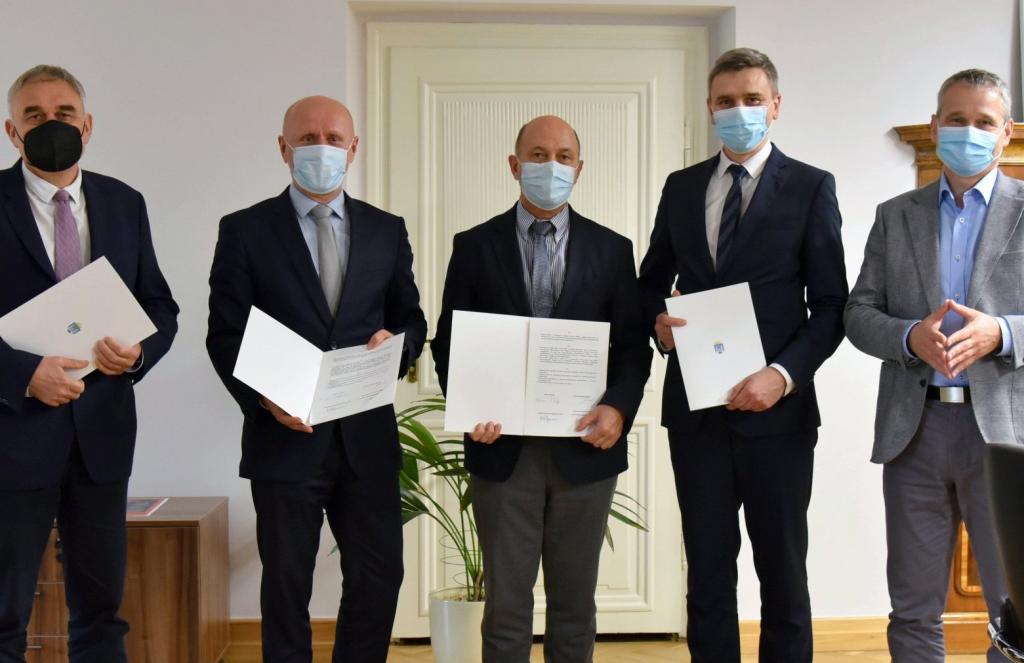Thessaloniki gets ready for its metro launch in November
The underground rapid transit lines have been under construction for almost two decades due to various project delays
 TheMayor.EU logo
TheMayor.EU logo 
The companies of the Aquanet Group and the Institute of Bioorganic Chemistry of the Polish Academy of Sciences will help the city of Poznan in sampling and testing of wastewater, Source: City of Poznan
This could give a more accurate picture of the actual number of infections
The city of Poznań informed on Monday that they have signed an agreement to launch a SARS-CoV-2 mRNA monitoring platform for wastewater. The Polish city believes that this will allow them to better determine how many city residents are sick with COVID-19. To do this, the authority will partner up with research and private partners.
On 18 October representatives Poznań, the Institute of Bioorganic Chemistry of the Polish Academy of Sciences and Aquanet Laboratorium and Aquanet SA agreed to cooperate on the monitoring of coronavirus in the sewage system.
According to Deputy Mayor Bartosz Guss, the agreement will allow estimating the real scale of infections in Poznań, for one. On the other hand, it will also benefit scientists to more accurately study variants and mutations of the coronavirus.
The project will unfold in the context of a growing number of infections in Poland and the insufficient levels of vaccinations in one of the largest Polish cities, which stand at around 68%.
Poznan will cooperate with experienced partners, that will take the samples and test them for the RNA content of the virus: Aquanet Group and the Institute of Bioorganic Chemistry of the Polish Academy of Sciences. Said partners will check how many copies of the virus RNA are in the samples and thus – discover how many city residents are sick with COVID-19.
“We were one of the first centres in Poland to start conducting this type of research already during the first waves of the pandemic,” commented Paweł Chudziński, President of the Management Board of Aquanet SA. Since June 2020, the method developed by analysts from Aquanet Laboratorium has been successfully implemented as part of the permanent monitoring of the sewage system in the Poznań agglomeration.
The results of research conducted so far clearly indicate that there is a relationship between the number of infections found by the Ministry of Health and the number of virus RNA copies detected in the samples. At most of the analyzed monitoring points, their numbers are now larger than the number of reported cases of infection in Poznań. This hints at the presence of a greater risk of infection than official data suggests, as there are obviously many people who show no symptoms, despite being infected.
Furthermore, the Institute of Bioorganic Chemistry will supplement the research on the presence of the virus in wastewater with the sequencing of its genome. This will identify variants that may be more virulent or infectious - similar to how the current Delta variant became dominant.
This approach is actually not a precedent for Europe. In September, Cyprus launched an EU-funded wastewater coronavirus-monitoring project, following the recommendation of the European Commission for a common approach to surveillance of SARS-CoV-2 and its variants in urban sewage across the EU. Moreover, TheMayor.EU reported in October 2020 of a similar collaboration between regional authorities and the University of Valencia.

The underground rapid transit lines have been under construction for almost two decades due to various project delays

Now you can get your wine in Talence by paying directly in Bitcoin

That’s because the state has to spend money on updating the railway infrastructure rather than subsidizing the cost of the popular pass

Rethinking renewable energy sources for the urban landscape

The examples, compiled by Beyond Fossil Fuels, can inform and inspire communities and entrepreneurs that still feel trepidation at the prospect of energy transition

Now you can get your wine in Talence by paying directly in Bitcoin

The 10th European Conference on Sustainable Cities and Towns (ESCT) sets the stage for stronger cooperation between the EU, national and local level to fast track Europe's transition to climate neutrality.

At least, that’s the promise made by the mayor of Paris, Anne Hidalgo

The underground rapid transit lines have been under construction for almost two decades due to various project delays

At least, that’s the promise made by the mayor of Paris, Anne Hidalgo

Hostal de Pinós is located in the geographical centre of the autonomous region

Despite its church-y name, the district has long been known as the hangout spot for the artsy crowds

Urban dwellers across the EU are having a say in making their surroundings friendlier to people and the environment.

Forests in the EU can help green the European construction industry and bolster a continent-wide push for architectural improvements.

Apply by 10 November and do your part for the transformation of European public spaces

An interview with the Mayor of a Polish city that seeks to reinvent itself

An interview with the newly elected ICLEI President and Mayor of Malmö

A conversation with the Mayor of Lisbon about the spirit and dimensions of innovation present in the Portuguese capital














